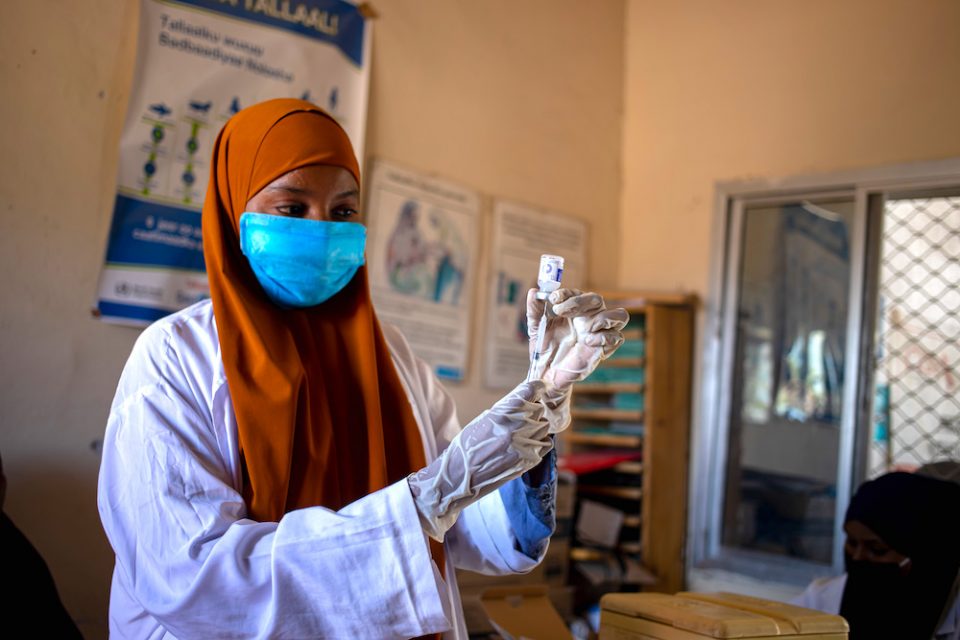In the first year of the Stronger Collaboration, Better Health: The Global Action Plan for Healthy Lives and Well-being for All (GAP), 12 signatory agencies have engaged with several countries to help them achieve their major health priorities. The initial focus has been on strengthening primary health care and sustainable financing for health. Somalia is one of the countries where progress under the GAP is most advanced and where its added value has been most clearly demonstrated.

Routine immunization in Shibis mother and child health facility, Benadir region, Somalia.
© WHO
The Somalia country Director and Representative of the World Food Programme, Dr Cesar Arroyo underlined the vital importance of the GAP – through cementing collaboration among the 12 agencies: “The GAP initiative marks a crucial step towards solving health-related challenges in Somalia and offers us an opportunity to strengthen our partnerships across the humanitarian community thereby enhancing operational efficiency, particularly within the COVID-19 context and beyond”.
Three decades of civil war and instability have weakened Somalia’s health system and contributed to it having some of the lowest health indicators in the world. The situation varies from region to region but between 26-70% of Somalia’s 15 million people live in poverty and an estimated 2.6 million people have been internally displaced.
But the Government is committed to using current opportunities to strengthen health and social development. These include implementation of Somali National Development Plan for 2019–2024 and the Somali Universal Health Coverage (UHC) Roadmap, launched in September 2019.
Both plans identify primary health care as the main approach to improving health outcomes in the country. Primary health care provides whole-person care for most health needs throughout the lifespan, ensuring that everyone can receive comprehensive care ─ ranging from health promotion and prevention to treatment, rehabilitation and palliative care ─ as close as possible to where they live.
Working together, the Government of Somalia, GAP agencies and multilateral and bilateral partners have identified 5 priorities for enhanced collaboration to accelerate progress towards UHC.
Says Monique Vledder, Head of Secretariat for the Global Financing Facility for Women, Children and Adolescents: “The launch of the Global Action Plan has helped accelerate momentum across global health agencies to align their support to country partners. In Somalia, the GFF has brought the spirit of the GAP from the global to the country level, convening partners across the federal and local governments, Somaliland, UN agencies, donors and civil society to establish the Health Sector Coordination Committee. Country stakeholders and GAP agencies are now building consensus around a priority package of essential services and critical health system reforms.”

A polio zonal officer is preparing vitamin A supplement for a child during a recent integrated campaign.
© WHO
-
- Establishment of a health coordination mechanismEfforts are underway to set up a coordination mechanism for all health partners to strengthen primary health care and fill gaps in services at the district level, building consensus around a priority package of essential services and critical health system reforms and mapping the availability of services and health workers.
- Improving access to a package of high-quality essential health servicesThe country’s health services package is being updated with support from GAP agencies and other partners, with a focus on prevention and community-based components, communicable and noncommunicable diseases, and mental health.
- Strengthening emergency preparedness and response through UHCSomalia is prone to emergencies from natural disasters and disease outbreaks and is now responding to COVID-19. GAP agencies are exploring opportunities to support the finalization and implementation of components of a National Action Plan for Health Security, which includes strengthening of laboratory and early warning systems and ensuring that a package of essential health services and key commodities are effectively delivered in humanitarian settings.

De Martini COVID-19 isolation center in Benadir, Somalia supported by WHO.
© WHO
- Strengthening the role and capacity of the Ministry of HealthThis is essential to address fragmented health service delivery and funding arrangements; improve institutional capacity for policy-making, regulation, coordination, planning, management and contracting; and use of data in decision-making.
- Harnessing the private sector for UHCPrivate health services and the pharmaceutical sector are largely unregulated in Somalia but could contribute to improving access and achieving UHC. GAP agencies are exploring opportunities to support the development and operationalization of a strategy for the private health sector, to assess its current role in service delivery and implementation of regulatory frameworks and contracting mechanisms.
“GAP provides us an opportunity to accelerate progress in achieving universal health coverage in Somalia through coordinated action and alignment with development partners and UN agencies. More than ever, we now need to push this agenda as we support the health systems of Somalia recover stronger and better from the COVID-19 pandemic“, said WHO Country Representative in Somalia, Dr Mamunur Malik .
“Our collective engagement in improving access to care for women, children, and other vulnerable groups will be decisive in improving health and well being in the country. Through an integrated, coordinated and collaborative approach such as the GAP, we can also build the required capacity of national and local health authorities to deliver not only cost-effective health interventions using a primary healthcare approach, but also monitor and track porgress of the health-related indicators of sustainable development goal in the country“, he added.

A doctor is preparing for routine immunization in Shibis mother and child health facility during COVID-19 in Benadir.
© WHO
Although there are many health and social challenges in Somalia, the GAP is leveraging emerging opportunities to strengthen primary health care to support the country in achieving UHC and other health-related SDGs.
To move these efforts forward, GAP agencies are collaborating with the Government to develop an operational plan. They aim to align this with the new funding that a number of agencies are providing for the response to COVID-19, to support the scale-up of primary health care, including implementation of the package of essential health services.
Source: WHO

